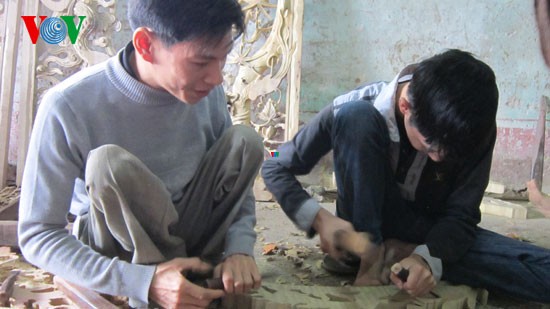(VOVworld)- There are more than 6.7 million disabled people in Vietnam, 15% of them have stable jobs and 10% have received vocational training. The Vietnamese State, social organizations and enterprises are developing polices and programs to help disabled people to have a job to stabilize their lives and integrate into the community. On the occasion of the Day for Vietnamese Disabled People, April 18, VOV reports on vocational training and job generations for people with disabilities.
 |
Over the past few years, Vietnam has paid a special attention to providing vocational training and generating jobs for the disabled. The 2006 Law on Vocation Training has a separate chapter on vocational training for the disabled helping them find a suitable job. The State has provided financial support and incentives to promote vocational training for these people. The Vietnamese Labor Code stipulates that every year, the State allocates part of the budget to help disabled people recover their health and working function, provides them with vocational training and low interest rate loans to help them improve their lives. In fact, the State has allocated millions of USD each year to strengthen vocational training for disabled people. There are more than 250 vocational training centers for the disabled across the country, of them 55 are only for the disabled.
The State has also paid a special attention to generating jobs for people with disability. The State has issued and put in place several incentives to encourage enterprises recruit disabled people. A National Fund for Employment has been set up. Since 2006, the Labor, Invalid and Social Affairs sector has regularly organized employment fairs, in which on section is allocated for the disabled attracting the participation of several enterprises and vocational training centers. In addition, many organizations have been set up to support the disabled. They include the Fund for Disabled in Vietnam, the Blue Ribbon Council and a network of 100 enterprises which generate jobs for the disabled. Greig Craft, Director General of Vietnam Protec Company, which employs disabled people, says: “We employ people with disabilities to our company because they are hard working people and can contribute as much as others do. We recruit them and pay them equally with other employees. We want our company to be a model for others to follow because other enterprises don’t know how much people with disabilities can contribute”.
However, the number of the disabled who can satisfy the demands of industrial jobs is small due to limitations of health and skill level. So, much attention has been paid to generating suitable jobs for the disabled. There are more than 400 workshops employing about 15,000 disabled workers in the country. 65% of households having disabled members benefit from preferential credits, production land support and tax exemption. Nguyen DInh Lieu, President of the Vietnam Fund for Support of the Disabled and Orphans, says: For the disabled, it’s important to enable them to have a job near their houses. The disabled can work in different places, in processing or industrial zones, but I think we should help them to find a job in their community where they can also be supported by their parents and relatives. This model has been piloted in the last three years and proved successful. Some disabled people have found jobs in cooperatives and private businesses.”
Under the National Action Program to Support the Disabled in the 2012-2020 period, the Vietnamese government continues prioritizing generating jobs for the disabled so that by 2015, 250,000 disabled people with working abilities will receive vocational training and have jobs. In this effort, Vietnam has been piloting the livelihood model for the disabled helping them to exercise their rights and obligations. Vietnam has put in place numerous policies to help disabled people improve their living conditions. Vietnam also aims to strengthen scientific research in prevention, detection, early intervention, and functional rehabilitation for the disabled, and boost international cooperation to take advantage of technical and financial support for the disabled.
Thu Hoa